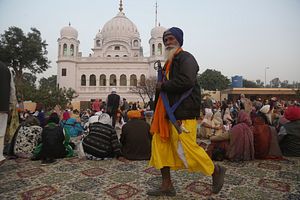Despite ongoing tensions with India, the government of Pakistan has announced plans to inaugurate the Kartarpur corridor in November 2019. The corridor is expected to provide visa-free access for Indian Sikh pilgrims to the Gurdwara in Kartarpur Sahib in Pakistan, one of the holiest places for the Sikh community.
While the corridor has been dubbed a “peace initiative” with the potential to put the Pakistan-India relationship back on track, the existing hostility between the two countries has significantly altered the corridor’s dynamics. By scrapping Article 370 and 35A of its constitution, India has demonstrated that the country is not interested in dialogue with Islamabad. Mainly, New Delhi has neutralized all major talking points that Pakistan could take-up with the country to create an environment supporting conditions for potential dialogue.
As of now, there is precisely no coordination between the two countries except the issue of the Kartarpur corridor. For Islamabad, the corridor is no longer a conduit to revive normalcy between the two countries. Moreover, Pakistan is not likely to look at the subject as an issue that is significant in terms of increasing interdependence between the people of the two countries. India’s move to integrate Kashmir has put Pakistan’s diplomacy in a tough spot. Domestically, there is a widespread view that questions the government’s policy to continue the ongoing work on the corridor. “I think Islamabad has put itself in a situation where abandoning the project may undermine the country’s interests,” said Bilal Ahmad, an analyst based at FC College in Lahore. He further added that “it’s unclear what Islamabad stands to gain strategically in the medium to long run from the project when India has abandoned the core area of dialogue concerning Pakistan-India conflict.”
The assessment remains persuasive: For more than 70 years, there has not been a focus on building interdependence by promoting people-to-people relations between the two countries. If anything, the existing popular culture remains focused on lifting enmity and underscoring imagined cultural dilemmas that prevent interdependence between the people of the two countries. Still, this doesn’t mean that the people of both countries do not desire a close working relationship. Shoaib Pervez, the dean of the Political Science Department at the University of Management and Technology believes that at the popular level, there still exists a desire for peace among the majority of people from both sides.
However, the desire for peace may have taken another hit after the recent events in Jammu and Kashmir. The existing distrust and cynicism at the level of the ruling elites on both sides are not likely to change with the implementation of the Kartarpur corridor. Both states view the project as an opportunity to gain politically and diplomatically. The Bharatiya Janata Party (BJP) in India doesn’t want to halt the work on the corridor because it stands to gain nothing by carrying out such an action. The policy decision in this regard for New Delhi convenes at a popular level that exists domestically in the form of appeasing the country’s Sikh population. It’s unlikely that the BJP-led government in India would want to be the first to cancel the ongoing construction work on the corridor. Apparently, New Delhi believes that its interests are better served if the decision in this regard comes from Pakistan.
Pakistan for its part is not going to cancel a project that can offer the country a vital constituency in India. Allowing its around 20 million Sikh population to visit one of their holiest places can effectively become a way to sway the policymaking process at some level.
Regardless of what the project means in the longer run, for Islamabad, the timing could not have been worse: the integration of Jammu and Kashmir at a time when the Kartarpur corridor has become a highlight of cooperation between India and Pakistan certainly adds pressure on Islamabad. Islamabad has to ensure that the project doesn’t result in the development of a narrative domestically questioning the existing policy decisions.
For now, neither India nor Pakistan wants to take the blame for the termination of the project.

































